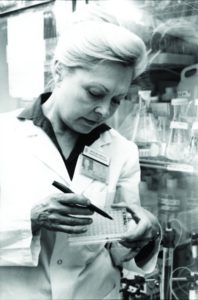Humanist Women in History: Mathilde Krim
March is Women’s History Month in the United States, the UK, and Australia. In commemoration we bring you this year’s four-part series, Humanist Women in History, starting with Mathilde Krim. Last year’s five-part series is here.
“Let us hope for our sake and the sake of generations to come that the counsel of humanists will continue to be sought in the formulation of public health policies.”
–AIDS research pioneer Mathilde Krim
 Mathilde Krim was born Mathilde Galland on July 9, 1926, in Como, Italy. Her agronomist father, Eugene, was Swiss-Italian, and her mother, Elizabeth, was from Austria. They moved to Geneva, Switzerland, when Krim was six years old.
Mathilde Krim was born Mathilde Galland on July 9, 1926, in Como, Italy. Her agronomist father, Eugene, was Swiss-Italian, and her mother, Elizabeth, was from Austria. They moved to Geneva, Switzerland, when Krim was six years old.
In 1945, when she was eighteen, Krim saw newsreel footage of a liberated Nazi concentration camp and was profoundly affected by the images of corpses and the starving survivors. It’s said the experience laid the foundation for a lifetime of humanitarian concern and activism. At the time, it drew her to an underground Zionist group called Irgun and she also helped smuggle guns to Palestinians fighting British rule.
Krim studied biology and genetics at the University of Geneva where she got her bachelor’s in 1948, the same year she converted to Judaism and married medical student and fellow Irgun member David Danon. They had a daughter, Daphna, in 1951. Two years later Krim finished her PhD and the three moved to Israel (she and Danon later divorced). Krim did cancer research at the Weizmann Institute of Science where she met and married attorney Arthur Krim, who later would head several movie studios and advise a number of Democratic presidents.
They moved to New York in 1959 where Krim continued her cancer research, first at Cornell Medical College and then, starting in 1962, at Sloan Kettering Cancer Center where she worked for many years and directed the interferon lab from 1981-1985. The Krims were active in the civil rights and gay rights movements. When the AIDS epidemic began in the early 1980s, Krim recognized the danger of stigmatization the gay community faced. In his 1997 book, The Gay Metropolis: The Landmark History of Gay Life in America, Charles Kaiser wrote of Krim, “The reaction of many of her heterosexual friends reminded her of the stories she had heard about Jews during the war, before she knew any herself, that they were dirty and evil and deserved to die.”
Krim dedicated herself to researching the disease and to fighting for its victims. With actress Elizabeth Taylor she founded AmFAR, the American Foundation for AIDS Research, and served as CEO from 1990-2004, helping raise hundreds of millions of dollars for AIDS research, HIV prevention, and advocacy. Krim promoted needle-exchange programs and condoms. She pilloried religious leaders who condemned homosexuality. She pushed policies to protect gay people from being discriminated against in housing, employment, and healthcare.
Krim was the recipient of many honors and awards, including sixteen honorary doctoral degrees and the Presidential Medal of Freedom, awarded to her in 2000 by then president Bill Clinton for her “extraordinary compassion and commitment.” In 1987 Krim received the American Humanist Association’s Humanist Distinguished Service Award. In her acceptance speech she challenged prevailing wisdom on how to control the AIDS epidemic, concluding:
The opinion of all the experts of the US Public Health Service and the Centers for Disease Control, as well as that of scholars who have given careful thought to various possible approaches to the control of the AIDS epidemic, is now that the protection of the public health from the scourge of AIDS is best served by a diligent protection of individual liberties and privacy. Mandatory testing is, therefore, clearly not the way to attempt to control this epidemic. Let us hope for our sake and the sake of generations to come that the counsel of humanists will continue to be sought in the formulation of public health policies.
Mathilde Krim died at her home in Kings Point, New York, on January 15, 2018.
